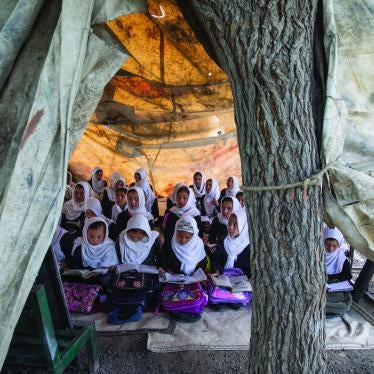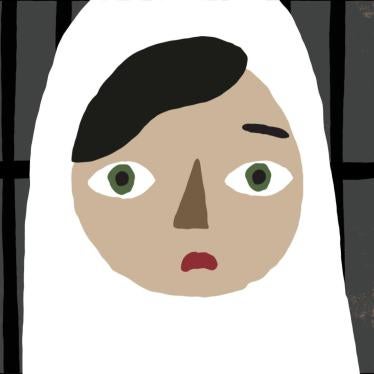Re: Education Quality Reform in Afghanistan (EQRA) project
Dear Vice Presidents Dixon and Sennhauser,
I am writing on behalf of Human Rights Watch to update you on our research and to raise urgent issues regarding the World Bank’s funding for girls’ education in Afghanistan. We are specifically interested in the Education Quality Reform in Afghanistan (EQRA), which we expect will be reviewed by the World Bank board this summer.
EQRA will be the third World Bank education project in Afghanistan since 2001, following EQUIP 1 and EQUIP 2. With an anticipated US$300 million budget, it will play a major role in setting the direction of international support for education in Afghanistan for years to come.
Human Rights Watch’s October 2017 report on girls’ access to education in Afghanistan,[1] attached, found that in many parts of Afghanistan the number of girls going to school is falling.[2] Based on 249 interviews, most with out-of-school girls, in Kabul, Kandahar, Balkh, and Nangarhar provinces, we found that while deteriorating security is a barrier to girls’ education, other important factors are also driving this decline.
Human Rights Watch’s research indicates that the Afghan government’s education system discriminates against or fails to provide access to education for girls in the following ways:
- There are fewer government schools for girls. The government has 5,260 boys-only general education schools, and 2,531 girls-only general education girls’ schools.[3]
- There is a dire shortage of female teachers – 20 percent or fewer in half Afghanistan’s provinces – and many families won’t let daughters study with a male teacher, especially as they get older. Afghan officials argue that it is difficult to get women to take teaching jobs, especially in remote areas, but a likely more important barrier is that because of corruption, teaching jobs are “purchased” in return for hundreds of dollars – something women are less able to do than men.[4]
- The government school system suffers from a lack of infrastructure, which specifically affects girls. For example, 60 percent of government schools have no toilets.[5] The lack of toilets has a disproportionate impact on girls, especially as they reach puberty and begin menstruation and have no facilities or privacy to manage their periods.
Our research also showed the importance of community-based education (CBE) programs, which are small schools that usually prioritize or solely serve girls. CBE is a completely parallel system of education from the government’s and risks being abandoned as funds are shifted from bilateral to multilateral funding mechanisms. As donors are giving less money, and the money they are giving is increasingly spent through pooled mechanisms rather than bilaterally, funding is being shifted out of CBE programs and into the government system that is not serving girls well — making it especially important that donors mitigate discrimination in the government system.[6]
In this context, we see the new EQRA project as a crucial moment for the World Bank to halt the decline in girls’ education in Afghanistan. Human Rights Watch strongly urges the Bank and the countries contributing to the Afghanistan Reconstruction Trust Fund to insist that EQRA include:
- A requirement that the government end discrimination in the number of girls’ schools versus boys’ schools. This can be done most quickly by turning boys’ schools into mixed schools, and accomplished through a shift system or separate classes in communities where co-education is not feasible;
- Specific targets and timeline for equalizing access of girls to equivalent qualified and adequately trained female teachers as boys have to male teachers;
- A specific plan, and funding, for ensuring that all mixed and girls’ schools have adequate toilets — meaning toilets that are accessible, private, locking, and have access to water on-site, waste receptacles, plans for upkeep, etc.;
- A long-term plan to ensure the survival of CBE by using EQRA to integrate CBE into the government school system. The Afghan Ministry of Education should receive EQRA funds to establish CBE programs for girls, and the World Bank should monitor closely to ensure that these schools are run properly and serve girls; and
- A commitment to monitoring with a focus on gender-equity, including gender disaggregation of all indicators, and specific monitoring of all measures focused on assisting girls. Monitoring of the EQRA program will be crucial to its success and needs to include, from the outset, indicators and monitoring mechanisms that will fully capture the impact of the program on girls.
Thank you, and we look forward to your response. We would also be most happy to discuss this research with you or your staff in person or by telephone.
Cc: World Bank Board of Executive Directors
[1] Human Rights Watch, “I Won’t be a Doctor and One Day You’ll Be Sick: Girls’ Access to Education in Afghanistan,” October 2017, https://www.hrw.org/report/2017/10/17/i-wont-be-doctor-and-one-day-youll-be-sick/girls-access-education-afghanistan (accessed June 12, 2018).
[2] This finding is confirmed by Afghan government statistics. Data in the government’s statistical yearbook for 2016-2017 compared to data 2015-2016 shows the number of girls enrolled in government schools fell in 32 out of 34 provinces. This decline is happening in a context in which girls were already frequently excluded. According to the Afghan Ministry of Education, 85 percent of all out-of-school children are girls. No province has 50 percent female students; in some provinces, enrolment is as low as 15 percent.
[3] Islamic Republic of Afghanistan Central Statistics Organization, Statistical Yearbook 2015-16 and 2016-17, http://cso.gov.af/en/page/1500/4722/2016-17 and http://cso.gov.af/en/page/1500/4722/2015-2016 (accessed June 11, 2018).
[4] Islamic Republic of Afghanistan Monitoring and Evaluation Committee, “Vulnerability to Corruption Assessment of the Ministry of Education,” October 2017, http://www.mec.af/files/2017_23_10_moe_english.pdf (accessed June 11, 2018).
[5] Islamic Republic of Afghanistan, Ministry of Education, “Afghanistan Education for All 2015 National Review,” 2015, http://unesdoc.unesco.org/images/0023/002327/232702e.pdf (accessed June 6, 2018), p. 25.
[6] CBE consists of small, local schools designed to provide primary education, often on an accelerated basis, to children who are unable to attend government schools due to reasons of distance, security, lack of female teachers, etc. There has been rigorous research showing that CBE helps to eliminate the gender gap in enrollment and in test scores.








